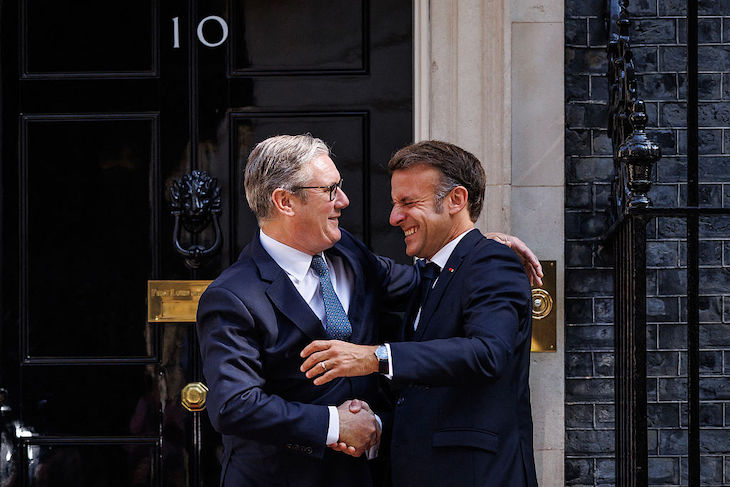‘Small boats’ are the big talking point from this week’s Franco-British summit. The consensus is that there are slim pickings for Britain, and the reason why is simple: France negotiates according to its interests, Britain negotiates according to the Chagos template.
France’s president Emmanuel Macron had little incentive to agree anything but a symbolic ‘returns’ agreement with Sir Keir Starmer. Most of the French political class, public opinion and ‘humanitarian’ organisations do not support Britain returning migrants to France. Nor for that matter do other EU states. Why would they? What then was Macron seeking from the summit?
The French president is still smarting from Brexit
The French president is still smarting from Brexit, as he all but confessed first to Parliament then at the summit’s press conference. The Aukus pact between Australia, the UK and US cutting the French out of Australian submarine construction, is another open wound. Macron wants his pound of flesh. He cut some from more arcane aspects of the Franco-British summit.
First, on aerospace Starmer agreed to inject 163 million euros (£140 million) into the French-led, Paris-based Eutelsat satellite business, hoping to challenge Elon Musk’s Starlink. Eutelsat’s 2022 take-over of Britain’s low orbit internet satellite network One Web was disingenuously badged as a merger. The French state now has a majority stake and the inevitable is happening. Despite One Web being headquartered in the UK and Britain having a thriving satellite industry, the next generation of Eutelsat satellites will be built in France. Little surprise that Macron posted impishly on social media: ‘Thanks to our British friends as they continue to follow us on the Eutelsat adventure!’.
‘Follow’ being the operative word, Sir Keir also obliged in the expansion of the present day 10,000 strong Franco-British Combined Joint Expeditionary force, created by the 2010 Lancaster House agreements and originally commanded from Northwood in the UK, being expanded to 50,000 and headquartered in Paris.
The supplicant Prime Minister conceded to Macron on nuclear issues. Much play has been made of Paris and London agreeing henceforth to coordinate their use of nuclear weapons, while retaining sovereign independence over their use. This is a personal win for Macron, whose neutered status in French domestic politics is combatted by his increased activism internationally. Macron will claim credit for securing the British nuclear deterrent as protection for the EU, thereby legitimising France as the rightful claimant to the role of Europe’s defence supremo.
But at the more secretive nuclear level, one fears further Starmer concessions. A little mentioned dimension of Franco-British defence collaboration, signed with the 2010 Lancaster House agreements, is the ‘Teutates Treaty’.
Here, the two states pledged collaboration on highly sophisticated nuclear weapons technology. Key to this is joint manufacture and operation of inordinately expensive computer equipment for military nuclear simulation and testing. This is vital to the upgrading of either state’s nuclear warheads in compliance with the international Nuclear Test Ban treaty. The billions pledged in 2010 have been discreetly drawn from the nuclear heading of the two countries defence budgets.
France benefitted greatly from Teutates. Forced by international opinion to stop undersea nuclear testing in the South Pacific in 1996, France needed to catch up on computer-generated nuclear test simulation, which Britain, with the Americans, had used for years.
Unsurprisingly, the centre for this joint research was based in France, not Britain, at Valduc near Dijon. Joint French and UK teams carry out state-of-the-art nuclear weapons simulation on the MERLIN flash X-ray radiographic machine, built at the Atomic Weapons Establishment at Aldermaston and shipped to France. As France prides itself – with some licence – on its independently manufactured and controlled nuclear deterrent, much French literature on the EPURE facility omits close cooperation with Britain.
Starmer and Macron’s closer nuclear collaboration will doubtless mean further expensive funding of the French EPURE facility, with Britain becoming ever more dependent on French goodwill for the upkeep of its nuclear deterrent. Will Macron have hinted to the gullible Starmer that in the Trumpian world France would be best sharing construction of Britain’s home produced and designed nuclear warheads? One wonders further whether deal-maker Starmer countenances an eventual French replacement for the American Trident nuclear missile delivery system in Britain’s nuclear deterrent? More British dependence on France for its ultimate protection inexorably leads to erosion of British sovereignty.
Starmer’s craving for a ‘reset’ with the EU made a Macron win at the summit effortless. But that will not suffice to heal Macron’s Brexito-Aukus scars. Though they did not sign that treaty, Keir Starmer and British civil servants would do well to recall that the treaty’s name ‘Teutates’ was also that of a Celtic god to whom the Gauls made human sacrifices.








Comments